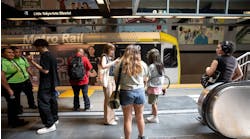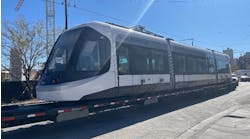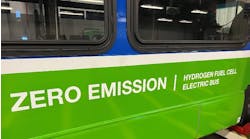Fares for Capital Metro will be changing as of Jan. 26 as the agency launches its new tiered fare system consisting of three main service categories: local, premium and commuter. In concert with the changes to fares, Capital Metro is also redesigning how its passes look.
A new premium fare category will be introduced to coincide with the start of MetroRapid service on Jan. 26. Premium fares will cost $1.50 for a single ride, $3 for a day pass, $13.50 for a 7-day pass and $49.50 for a 31-day pass.
Services included in the premium fare category will be MetroRapid and flyer routes 100-199, which have limited stop service. By purchasing a premium pass, riders will have access to all Local bus service, as well. The new pass is now available for purchase at local retail outlets, Captial Metro's website and at the transit store.
One of the changes to the fare structure involves the current regional fare category, which will become the new commuter category. This type of fare includes access to MetroRail, MetroExpress, local and premium services.
Capital Metro is simplifying MetroRail service by eliminating rail zones after Jan. 26. Riders who purchase a commuter pass can also board rail connector buses, however those purchasing a single ride will also need to buy a local single ride for $1 if they would like to make a connection. MetroRail platforms will sell only commuter fares at ticket vending machines.
Other changes to the fare structure include the addition of a new single ride for MetroAccess riders, which will allow for extra flexibility in trip planning. This new option will be available for $1.50 for qualifying customers, and will be available for sale at the transit store or through the new mobile app.
All local and regional passes and stored value cards will continue to work normally until they expire, and customers who purchase passes before Jan. 26 may also continue to use them until they expire. The sale of passes will be limited to two per customer beginning Jan. 20.
Current flyer route riders will need to upgrade their Local Pass to the Premium fare after the fare change. Unused passes can be upgraded between Jan. 27-Feb. 28 at the transit store.
In addition, reduced 7-day passes will not work after Jan. 26 and will no longer be available for purchase after the new fare structure goes into effect. This type of pass can be upgraded to a Reduced 31-Day Pass between Jan. 27-Feb. 28 at the transit store.
Capital Metro will continue its current partnerships with The University of Texas, Austin Community College and the city of Austin to provide access to all services throughout 2014.
As part of the rollout of MetroRapid service on Jan. 26, Capital Metro will introduce a new free mobile app that lets passengers buy local, premium, commuter and MetroAccess passes with their smart devices. After a pass is purchased, the smart device then becomes the rider’s pass. The app, called the CapMetro App, can be downloaded starting Jan. 20 through the Apple Store, Google Play and Windows Store. Between Jan. 20-Feb. 28, Capital Metro will offer a free 7-day premium pass to those who use the new app to purchase any 7- or 31-day premium passes.
Capital Metro Vice President of Marketing and Communications Dan Dawson said the new fare structure is part of the agency’s ongoing process to improve operations and enhance services.
“We extensively studied our fare structure last year to find ways to make it more streamlined and equitable,” he said. “We also involved the public through a series of outreach opportunities over the course of several months, which greatly helped to shape the final proposal.”
Dawson noted that Capital Metro’s current fares are lower than the average of all Texas transit agencies, and some of the lowest fares nationwide. When adjusted for inflation, the current single ride fare of $1 has less value than the fare in 1985 when the agency was founded.
Although the cost of doing business has steadily grown, Capital Metro has not passed its rising costs along to its customers. From 1990 to 2008, the base fare remained at 50 cents, even though the cost of gas increased by 150 percent during that same time period. Capital Metro did have modest fare increases in 2008 and 2010. In 2011, the agency introduced a half-priced fare for seniors and persons with disabilities.
“Capital Metro has greatly improved its financial transparency and stability over the last few years,” said Dawson, “and we have worked hard to make our operations more productive and efficient. This fare restructure is part of the overall plan to keep Capital Metro sustainable by having the necessary funds available to serve the growing region.”
To help low-income residents in the community who may have affordability issues with the new fares, Dawson reiterated the agency’s strong commitment to ensuring the system is accessible to everyone in the community, regardless of income.
“We plan to continue the partnerships we’ve developed with non-profit and social service agencies to ensure that our low-income, transit-dependent neighbors can continue to use our system,” he said.
In 2011, Capital Metro helped establish the Basic Transportation Needs Fund (BTNF), a non-profit organization that helps a variety of social service agencies meet the transportation needs of their clients. So far, Capital Metro has invested half a million dollars in the fund, and as part of the fare restructure approved in 2013, the board of directors voted to add $100,000 to the BTNF for FY2014.
Capital Metro sought out feedback to its proposal in 2013 through a series of public outreach opportunities. The proposal was approved by the agency’s board last September. The fare restructure will be implemented over the next two years and is consistent with the board-adopted fare policy that recommends fare adjustments be developed in conjunction with the annual budget process.


